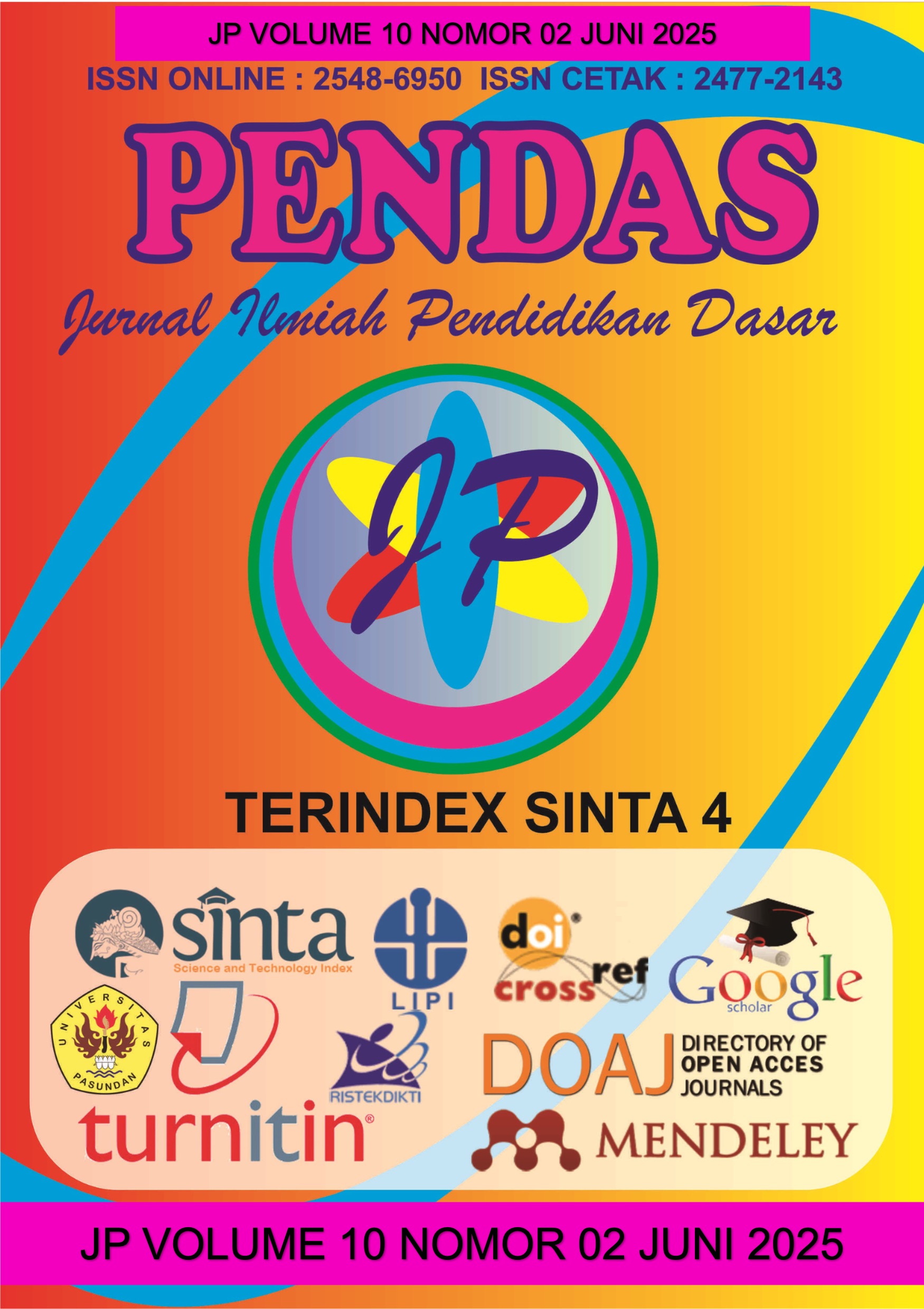STUDI LITERATUR; PENGARUH MODEL PEMBELAJARAN KOOPERATIF TIPE STAD (Student Teams Achievement Division) TERHADAP HASIL BELAJAR MATEMATIKA SISWA
DOI:
https://doi.org/10.23969/jp.v10i02.26029Keywords:
Student Teams Achievement Division, cooperative learning, Learning Outcomes, Mathematics, literature studyAbstract
Using a literature study methodology, this study seeks to examine how students' learning results in mathematics are impacted by the Student Teams Achievement Division (STAD) cooperative learning paradigm. The STAD model places a strong emphasis on collaboration in small, diverse groups where students study together, take individual tests, and earn rewards for their collective performance. Applying the STAD model can greatly enhance mathematics learning outcomes, according to the findings of a review of several earlier studies. Pupils gain greater motivation, become more engaged, and comprehend things more deeply. Additionally, STAD promotes constructive social contact among group members as well as a sense of personal accountability. These results suggest that the STAD approach may be a useful and engaging substitute for traditional classroom instruction in mathematics. The teacher's learning technique in the classroom should therefore take this model into account.
Keywords: Student Teams Achievement Division, cooperative learning, Learning Outcomes, Mathematics, literature study
ABSTRAK
Dengan menggunakan metodologi studi literatur, penelitian ini berupaya untuk meneliti bagaimana hasil belajar siswa dalam matematika dipengaruhi oleh paradigma pembelajaran kooperatif Student Teams Achievement Division (STAD).
Model STAD menempatkan penekanan kuat pada kolaborasi dalam kelompok-kelompok kecil yang beragam di mana siswa belajar bersama, mengikuti tes individu, dan memperoleh penghargaan atas kinerja kolektif mereka.
Menerapkan model STAD dapat meningkatkan hasil belajar matematika secara signifikan, menurut temuan tinjauan beberapa penelitian sebelumnya. Siswa memperoleh motivasi yang lebih besar, menjadi lebih terlibat, dan memahami berbagai hal secara lebih mendalam. Selain itu, STAD mendorong kontak sosial yang konstruktif di antara anggota kelompok serta rasa tanggung jawab pribadi. Hasil ini menunjukkan bahwa pendekatan STAD dapat menjadi pengganti yang berguna dan menarik untuk pengajaran matematika tradisional di kelas. Oleh karena itu, teknik pembelajaran guru di kelas harus mempertimbangkan model ini.
Kata kunci: Student Teams Achievement Division, pembelajaran kooperatif, hasil belajar, matematika, studi literatur
Downloads
References
Adnyana, E. M. (2020). Implementasi Model Pembelajaran Stad Untuk Meningkatkan Motivasi Dan Prestasi Belajar. Indonesian Journal of Educational Development, 1(3), 496–505. https://doi.org/10.5281/zenodo.4286979
Kusumawardani, N., Siswanto, J., & Purnamasari, V. (2018). Pengaruh Model Pembelajaran Kooperatif Tipe STAD Berbantuan Media Poster Terhadap Hasil Belajar Peserta Didik. Jurnal Ilmiah Sekolah Dasar, 2(2), 170. https://doi.org/10.23887/jisd.v2i2.15487
Nur Syamsu, F., Rahmawati, I., & Suyitno, S. (2019). Keefektifan Model Pembelajaran STAD terhadap Hasil Belajar Matematika Materi Bangun Ruang. International Journal of Elementary Education, 3(3), 344. https://doi.org/10.23887/ijee.v3i3.19450
Tsabita, D. W., Zulkarnain, F. O., Adi, I. G. A. R. K. D., & Evaldus, J. D. (2023). Efektivitas Model Pembelajaran Kooperatif Tipe STAD terhadap Hasil Belajar Siswa. Griya Journal of Mathematics Education and Application, 3(2), 466–474. https://doi.org/10.29303/griya.v3i2.321
Wulandari, I. (2022). Model Pembelajaran Kooperatif Tipe STAD ( Student Teams Achievement Division) dalam Pembelajaran MI. Jurnal Papeda: Jurnal Publikasi Pendidikan Dasar, 4(1), 17–23. https://doi.org/10.36232/jurnalpendidikandasar.v4i1.1754
Downloads
Published
Issue
Section
License
Copyright (c) 2025 Pendas : Jurnal Ilmiah Pendidikan Dasar

This work is licensed under a Creative Commons Attribution 4.0 International License.














































